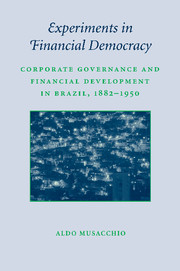 Experiments in Financial Democracy
Experiments in Financial Democracy Published online by Cambridge University Press: 30 January 2010
The evidence presented thus far of relatively developed equity and debt markets in Brazil at the turn of the twentieth century, with a bonanza between 1890 and 1920 when the stock exchange's capitalization fluctuated between 40% (1895) and 20% (1920) of GDP and the stock of private bond issues amounted to 15% of GDP, has indicated that financial market development was sustained by institutional settings that afforded ample investor protections. In this context we would not expect to find intermediaries such as universal or commercial banks playing the role of market makers. That is, we would not expect bankers to have played an important role in brokering information, relations, and long-term credit. Does history meet this expectation?
In more developed economies during this period, commercial and investment banks did play the role of market makers, “replacing” shareholder and creditor protections and providing “housekeeping seals of approval” for corporations subject, through their management teams, to the banks' influence. In the United States investment bankers played the role of market makers by underwriting securities for companies that they could monitor and influence through interlocking boards of directors. German banks also played an important role as intermediaries between investors and companies, purchasing stocks (and bonds) of German corporations in blocks and then selling them to their accountholders through a system of intrabank trading.
To save this book to your Kindle, first ensure [email protected] is added to your Approved Personal Document E-mail List under your Personal Document Settings on the Manage Your Content and Devices page of your Amazon account. Then enter the ‘name’ part of your Kindle email address below. Find out more about saving to your Kindle.
Note you can select to save to either the @free.kindle.com or @kindle.com variations. ‘@free.kindle.com’ emails are free but can only be saved to your device when it is connected to wi-fi. ‘@kindle.com’ emails can be delivered even when you are not connected to wi-fi, but note that service fees apply.
Find out more about the Kindle Personal Document Service.
To save content items to your account, please confirm that you agree to abide by our usage policies. If this is the first time you use this feature, you will be asked to authorise Cambridge Core to connect with your account. Find out more about saving content to Dropbox.
To save content items to your account, please confirm that you agree to abide by our usage policies. If this is the first time you use this feature, you will be asked to authorise Cambridge Core to connect with your account. Find out more about saving content to Google Drive.